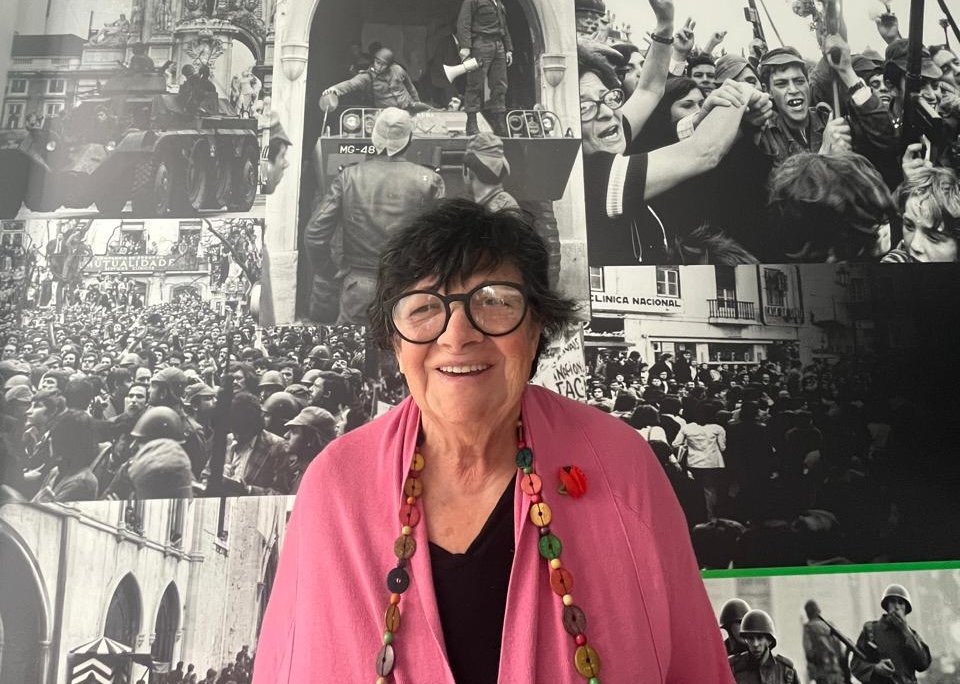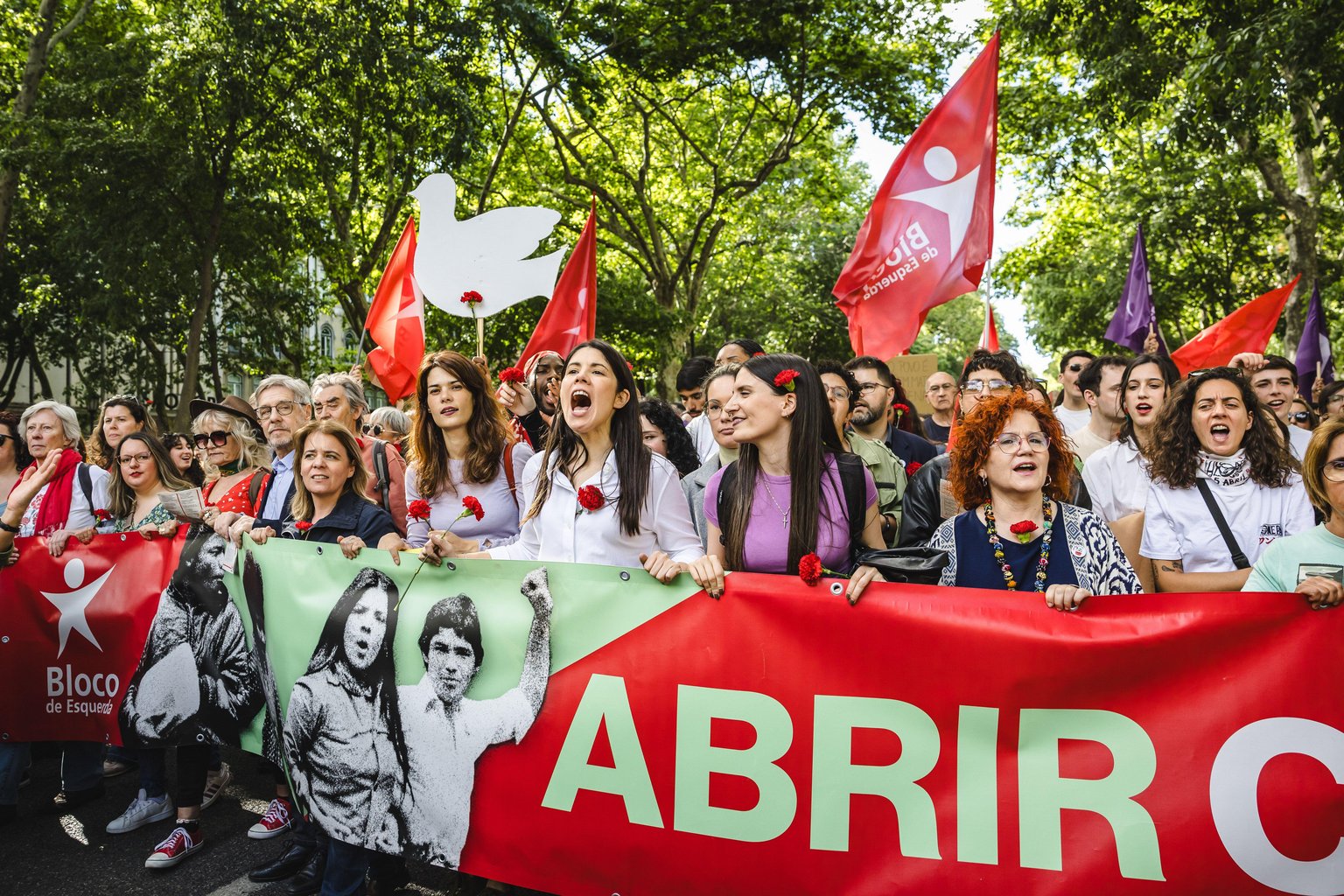LISBON – This year, Portugal celebrates 50 years since it lost its colonies without much longing for its buried, dictatorial past. Carnations are the symbol of Portugal’s 1974 revolution, which began with a military coup on 25 April of that year but soon grew into a civil resistance movement that marked the end of one of Europe’s longest-lasting fascist regimes. This year, I was in Lisbon for its 50th anniversary.
The occasion was both inspiring and fraught for me. At a venue called the 25 April Center, I sat with Cristina and Susana Brites at a table littered with carnations. The sisters were working on installations for a revolutionary art exhibition that their mother, Maria Brites, was assembling. The motifs included hands in broken chains and faces behind prison bars, recalling the victims of Portugal’s dictatorship under Francisco Salazar and his successor, Marcelo Caetano.
The images and the stories from Portugal’s past reminded me painfully of my native Russia. There, too, certain speech is suppressed, certain art forbidden, theatres shut down, police violence rampant. In my lifetime, Russia both won and lost its freedom. Other Eastern European countries, most notably Hungary, seem to be heading in a similar direction. How, I wondered, did the Portuguese manage to stay so committed to their democracy for 50 years?
As the Brites women worked on the flowers, they sang a revolutionary anthem called “Grandola Vila Morena.” The fascist regime had banned this song; the underground resistance played it on the radio the night of 24 April 1974 to signal that the revolution would start in the morning.
Land of brotherhood, the lyrics exclaim, The people are the ones who hold the greatest power / Within your walls, oh city!
Women "had no rights” under Salazar
Somehow, most in Portugal seem not to feel the tug of imperial nostalgia. It is the only former dictatorship I have visited, and I have visited many, where I never hear declarations like: “This country needs a Salazar.”
In 2007, Putin torpedoed the Cold War narrative in his inflammatory speech at the Munich Security Conference; he also dreamt of creating a free-trade zone from Vladivostok to Lisbon after visiting Portugal, never admitting his own fear of liberal democracy.
Portugal did not just shed its dictatorial past; it has become a leader of multilateral democracy, as evidenced by the Treaty of Lisbon and Antonio Guterres as Secretary General of the United Nations. An absolute majority of Portuguese – 81% – told pollsters for the Institute of Social Science this spring that they were proud of the way that Portugal became a democracy, which involved not just ending Portugal’s dictatorship at home but also liberating Portugal’s colonies in India, Africa, China, and East Timor.
For many Portuguese, recalling the era of authoritarian rule is far more painful than aggrandising. Maria Brites told me of being “utterly unhappy” under Salazar and his successor in the provincial town where she taught art and raised her daughters. The dictatorship forbade divorce, and hers was a miserable marriage: “Every month, he picked up my salary at school,” she said of her husband, “as all men were allowed to do that to women. We had no rights.”
On the morning of 25 April, her father called her to tell her that the revolution had happened, and she rushed to Lisbon to see it for herself, even though, she says, her husband tried to stop her with threats. Arriving in Lisbon, she felt what she describes now as “complete happiness, freedom to say what you felt like.” That freedom also allowed Maria to leave her husband and command her own life.
Isabel Graca, a history professor at the Senior University of Almada, also spoke to me about the restrictions on women under the dictatorship. “No woman under Salazar could travel abroad without her husband’s permission. They once did not allow me and my mother to cross the border to Spain because we did not have my father’s permission,” she told me. “As a student, I ran away from the police many times. We were banned from gathering in groups of more than three people. Punishment was severe.”
For these women, the civil liberties they could not have under dictatorship were far more critical than the distant territories that fascist Portugal claimed to control. This is exactly the case in today's Russia, where millions of people suffer from poverty, domestic violence, corruption and a poor health system and where none of Putin's imperialistic ideas and promises to build the "new world order" together with China can distract people from their daily miseries.

Maria Brites, who said before the revolution, women "had no rights” under Salazar (Credit: Anna Nemtsova)
"We were sworn to defend the people, or Portugal, our country, but not the dictatorship.”
Improbably for a democratic revolution, Portugal’s transition began with a coup, as military officers who opposed the regime rose up against it, in no small part because of the country’s imperial adventures abroad and, specifically, the financial cost of fighting to maintain its African colonies.
On 22 April, I had lunch with some of those officers. Colonel Aprigio Ramalho told me that the trips he made to Mozambique and Angola under the dictatorship were part of what galvanised his action. The war went on for 13 years and caused many thousands of deaths. “The failing African wars were the turning point for the revolution,” the colonel told me. And the analogy to Ukraine was not lost on him: “Russian military men should read their oath well. We did. We were sworn to defend the people, or Portugal, our country, but not the dictatorship.”
Some among both the revolutionary officers and the civic movement were communists in 1974, and so the anniversary celebrations salute them with hammers and sickles on its banners and billboards. For those of us from the former Soviet Union, these symbols carry a valence that is hard to reconcile. Particularly among Ukrainians I spoke to— and Portugal is now home to a Ukrainian diaspora 56,000 strong—the iconography cuts against the message of freedom. Communists in Portugal may have helped end the authoritarian era, they say, but in occupied Ukraine, the same symbols signal its return.
Ukraine’s President Volodymyr Zelensky says that Russia has to “repay for everything you did against Ukraine.” Russia is already paying for the war by having its assets in the West frozen. Russian state propaganda is watching closely the debates among Portuguese authorities about colonial and slavery reparations. On the day of the anniversary, President Marcelo Rebelo de Sousa said that Portugal “has to pay the costs” for all the crimes committed during the years of transatlantic slavery.
Portugal has been moving in a friendly direction to the Ukrainian view of the war. Some 55% of Portuguese have a negative view of Russia’s influence in global affairs, according to a Transatlantic Trends report, and more than 60% want to offer Ukraine NATO and European Union membership. Pedro Magalhaes, a senior researcher at Portugal’s Institute of Social Sciences, told me that Portugal has little reason to worry about the role of communists in its political life. On the contrary, he said, “Communists have been reliable democratic actors, involved in revising the constitution, controlling law-abiding unions, and having representatives in parliament.”
What Portugal seems notably to lack, compared not just to Russia but to Hungary or even Spain, is significant nostalgia for the empire. In Hungary, a country that has notoriously backslid, a survey conducted a few years ago by the Hungarian Academy of Sciences showed that 85% of citizens believed that the Treaty of Trianon, which established the country’s borders in 1920, was unjust. The Hungarian leader Victor Orban, known as Putin’s “Trojan horse” inside the European Union, is praising China as “the pilar for the new world order,” calling on the country to redraw the power map of the European Union: “We have no chance but occupy Brussels,” he said in March before President of China Xi Jinping visited Budapest.
A majority of Hungarians yearn for dominion over the lands populated by Hungarians in Romania, Slovakia, Serbia, Austria, and Ukraine. This nostalgia for a great power like Russia’s is a recipe for democratic backsliding; it often encourages abuse of power inimical to freedom.
Gennady Gudkov, a former KGB officer and now an opposition activist in exile, told me that he does not foresee a revolution in today’s Russia. Nobody does, but nobody ever does. Unlike Portugal in the 1970s, Russia does not have an underground resistance in the army, its Orthodox Church, or among its workers. “Army officers can see how terrible things are in the regime, but they are too scared of arrest while Putin continues to rule, empowered by Russia’s nostalgia for Soviet empire,” Gudkov said.
Graca, the history professor, sees in Portugal’s experience a parable of choice. “Choose freedom, stop missing the empire, stop suppressing your people, free them,” she said of what April 25, 1974, means for her. “It’s so easy to be in love with freedom.”
Opening image: Marches in Lisbon on 25 April, a national holiday in Portugal. (Photo by Henrique Casinhas/SOPA Images/Sipa USA)
